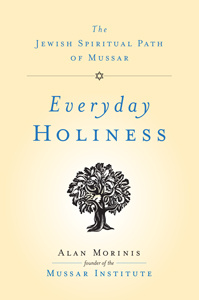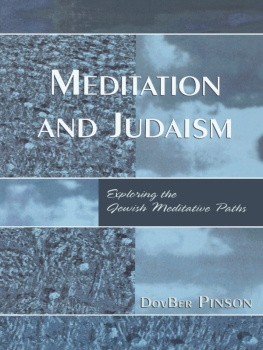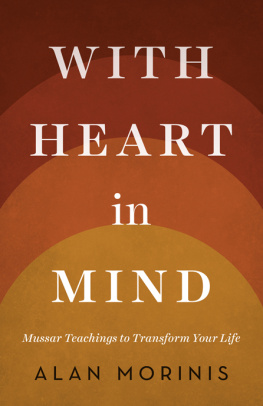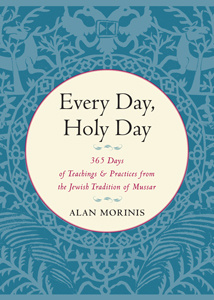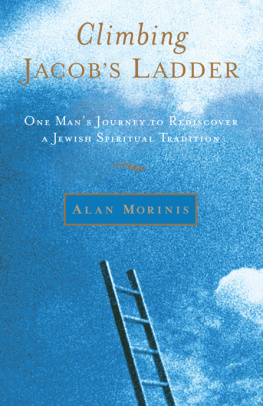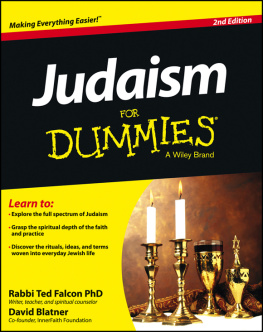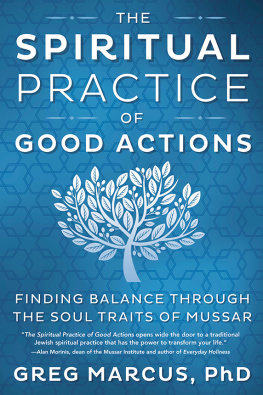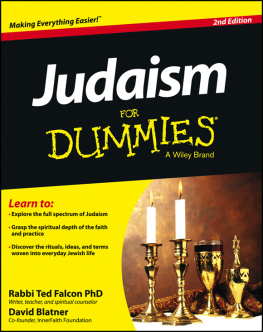Every Day, Holy Day is about something that should concern us all: bettering ourselves spiritually.
The Chicago Jewish News
An essential companion for anyone who wants to experience the life-changing gifts of Mussar. It is remarkably simple, and also remarkably effective in helping you overcome negative tendencies and strengthen positive onesand to reveal your innate holiness in the process.
www.jewishgrowth.org
Packed with ideas that are well worth pondering. Taking the time, making the effort to be intentional about reading a new page each day, repeating the phrase, even singing it, and then taking action through the daily practice, is likely to be as transformative as Morinis hopes.
Atlanta Jewish-Times
ABOUT THE BOOK
The myriad events and interactions that make up our everyday life provide a rich opportunity for us to examine our impulses and actions and grow spiritually, according to the Jewish practice of Mussar. Mussar is an eminently wise, practical, and effective way to cultivate awareness, gratitude, personal growth, and ethical action on a daily basis. The path has its origins in Orthodox Judaism but it has become popular with Jews of all affiliations who are interested in a practice that can infuse daily life with more purpose and meaning.
This daybook will be an essential companion to anyone who wants to experience this life-changing contemplative practice. Using a soul trait such as honesty, courage, enthusiasm, honor, and equanimity as a starting point, each practice page includes:
- a teaching that illuminates the trait of the day
- an affirmation phrase focused on that trait
- a practical exercise to expand our experience of the trait
- a space for journaling about experiences with the trait
To learn more, visit www.mussarinstitute.org.
ALAN MORINIS completed his doctorate at Oxford University, which he attended on a Rhodes Scholarship. A producer of award-winning television and film, he has been a student of the Mussar tradition since 1997, studying under Rabbi Yechiel Yitzchok Perr. Alan is the founder and director of the Mussar Institute, an organization that promotes the study of Mussar through study groups, courses, and public talks. He lives in Vancouver, British Columbia, with his wife and two daughters.
Sign up to learn more about our books and receive special offers from Shambhala Publications.

Or visit us online to sign up at shambhala.com/eshambhala.
EVERY DAY,
HOLY DAY
365 Days of Teachings and Practices
from the Jewish Tradition of Mussar
Alan Morinis
ASSISTED BY
RABBI MICHA BERGER

TRUMPETER
Boston & London
2011
Trumpeter Books
An imprint of Shambhala Publications, Inc.
Horticultural Hall
300 Massachusetts Avenue
Boston, Massachusetts 02115
trumpeterbooks.com
2010 by Alan Morinis
All rights reserved. No part of this book may be reproduced in any form or by any means, electronic or mechanical, including photocopying, recording, or by any information storage and retrieval system, without permission in writing from the publisher.
Library of Congress Cataloging-in-Publication Data
Every day, holy day: 365 days of teachings and practices from the Jewish tradition of mussar/edited by Alan Morinis; assisted by Micha Berger.
p. cm.
eISBN 978-0-8348-2219-1
ISBN: 978-1-59030-810-3
1. Jewish devotional calendars. 2. Jewish ethics. 3. Spiritual lifeJudaism. 4. Self-actualization (Psychology)Religious aspectsJudaism. 5. Musar movement.
I. Morinis, E. Alan. II. Berger, Micha.
BM724.E95 2010
296.72dc22
2010008307
WHAT IS MUSSAR?
MUSSAR IS A JEWISH spiritual tradition that offers insight and guidance for living by directing us to pay attention to the impact that our inner traits have on our lives. The Mussar teachers take note of the Torahs teaching, You shall be holy (Leviticus 19:1), and find in this injunction the primary guideline for living. They perceive that each of us at our core is inherently a holy being, and the issue of living is to recognize and then to remove the obstacles to that inborn holiness. Those obstacles show up in our lives as inner traits (middot) that are tending toward either extreme. Those extreme qualities (which will be different for each of us) make up a personal spiritual curriculum, whether that be too much or too little patience, an excessive tendency to generosity or miserliness, rage or indifference, and so on. The path of Mussar begins with coming to awareness of the traits that are on your spiritual curriculum, and then doing the work to change those traits, to bring them back toward the mean. Mussar has developed as a perspective on life, an insightful body of knowledge about human nature, and as a path of practice, all devoted to helping each of us overcome negative tendencies, strengthen the positive, and take steps in the direction of the holy.
Mussar has its origins in the Bible itself (see, for example, Proverbs 4:13: Hold fast to mussar and do not let go.). It emerged as a unique area of study in the tenth century, in the writings of the Babylonian sage Saadia Gaon (892942), and developed into a path of practice in the nineteenth century. This phenomenon was known as the Mussar movement, which centered in Lithuania and was led by Rabbi Yisrael Salanter. Mussar almost disappeared from sight in the aftermath of the Holocaust, when the pathways of Jewish spiritual practice were allowed (or, in some cases, deliberately caused) to grow over and become unavailable. The teachings and ways of Mussar are now being discovered or rediscovered in all segments of the Jewish world and beyond, because the wisdom that is embodied in Mussar offers unparalleled guidance in how to live a fulfilling human life. In so many ways, the masters of Mussar got it right, as much for this generation as for previous ones.
Mussar has always been a daily practice, and so this book is organized according to that traditional format. It offers you inspiration and support as a daily companion on your spiritual journey, and marks a pathway toward the goal of Mussar study and practice, which is to uncover the innate holiness that radiates within your soul. That goal also has roots in the Bible, where we find in several places straightforward advice to make holiness the aim of our lives. You shall be holy (Leviticus 19:1) is how the Torah puts it, and in directing us in this way, the verse uses the plural to indicate that every individual ought to make his or her spiritual life their highest priority. As Rabbi Yechezkel Levenstein, a recent Mussar teacher put it, A persons primary mission in this world is to purify and elevate his soul (Sichos Mussar, ed. Yitzchok Kirzner, Lakewood, N.J.: Alter Yosef Gartenhaus, 2004, 1213.5).
Mussar teachers have sought to help us transform our lives in the way of holiness. The path they discovered lies not in any esoteric or other-worldly area, but right within the realm of our familiar inner livesthe Mussar path to holiness goes by way of the territory of anger and calmness, generosity and miserliness, trust and worry, laziness and zeal, and all the other traits that live within us. We become holy not by becoming other than who we are, but by recognizing which traits we find challenging in the realities of our lives and then mastering them.
When a person has successfully identified and balanced all his or her inner traits, the Mussar teachers say that person has become whole, or
Next page
